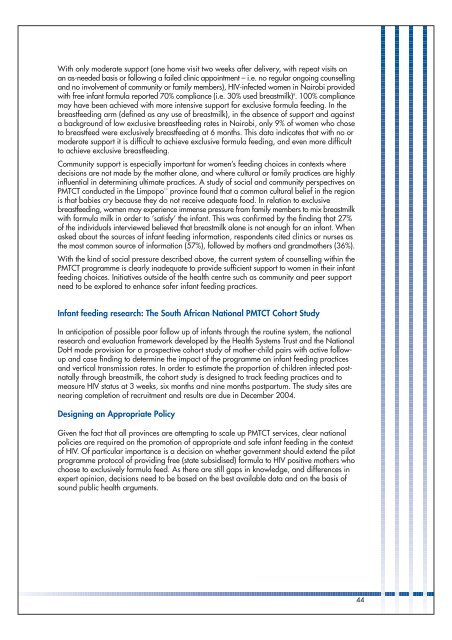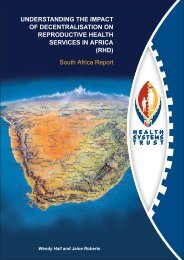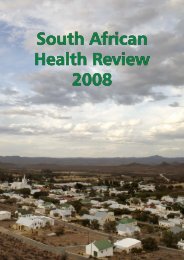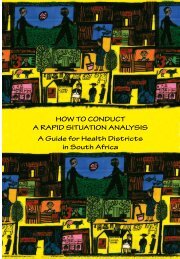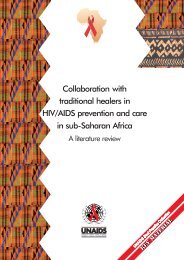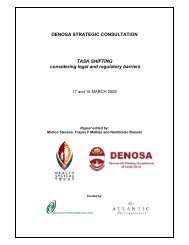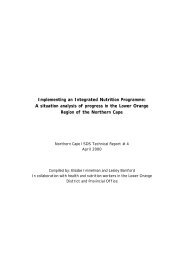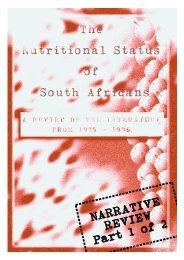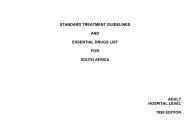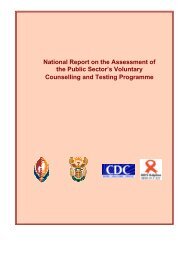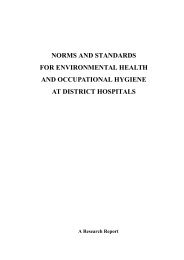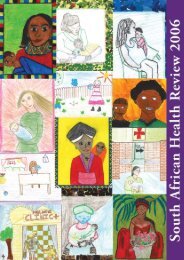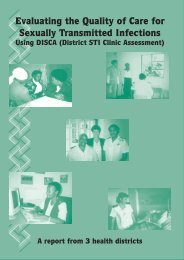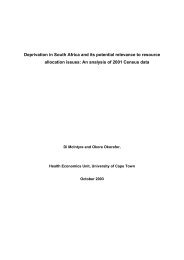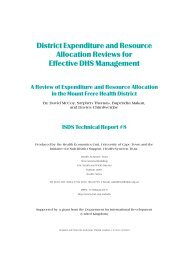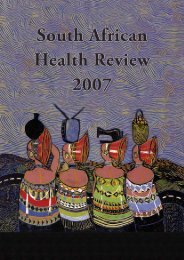PMTCT, and National's - Health Systems Trust
PMTCT, and National's - Health Systems Trust
PMTCT, and National's - Health Systems Trust
You also want an ePaper? Increase the reach of your titles
YUMPU automatically turns print PDFs into web optimized ePapers that Google loves.
With only moderate support (one home visit two weeks after delivery, with repeat visits on<br />
an as-needed basis or following a failed clinic appointment – i.e. no regular ongoing counselling<br />
<strong>and</strong> no involvement of community or family members), HIV-infected women in Nairobi provided<br />
with free infant formula reported 70% compliance (i.e. 30% used breastmilk) 6 . 100% compliance<br />
may have been achieved with more intensive support for exclusive formula feeding. In the<br />
breastfeeding arm (defined as any use of breastmilk), in the absence of support <strong>and</strong> against<br />
a background of low exclusive breastfeeding rates in Nairobi, only 9% of women who chose<br />
to breastfeed were exclusively breastfeeding at 6 months. This data indicates that with no or<br />
moderate support it is difficult to achieve exclusive formula feeding, <strong>and</strong> even more difficult<br />
to achieve exclusive breastfeeding.<br />
Community support is especially important for women’s feeding choices in contexts where<br />
decisions are not made by the mother alone, <strong>and</strong> where cultural or family practices are highly<br />
influential in determining ultimate practices. A study of social <strong>and</strong> community perspectives on<br />
<strong>PMTCT</strong> conducted in the Limpopo 11 province found that a common cultural belief in the region<br />
is that babies cry because they do not receive adequate food. In relation to exclusive<br />
breastfeeding, women may experience immense pressure from family members to mix breastmilk<br />
with formula milk in order to ‘satisfy’ the infant. This was confirmed by the finding that 27%<br />
of the individuals interviewed believed that breastmilk alone is not enough for an infant. When<br />
asked about the sources of infant feeding information, respondents cited clinics or nurses as<br />
the most common source of information (57%), followed by mothers <strong>and</strong> gr<strong>and</strong>mothers (36%).<br />
With the kind of social pressure described above, the current system of counselling within the<br />
<strong>PMTCT</strong> programme is clearly inadequate to provide sufficient support to women in their infant<br />
feeding choices. Initiatives outside of the health centre such as community <strong>and</strong> peer support<br />
need to be explored to enhance safer infant feeding practices.<br />
Infant feeding research: The South African National <strong>PMTCT</strong> Cohort Study<br />
In anticipation of possible poor follow up of infants through the routine system, the national<br />
research <strong>and</strong> evaluation framework developed by the <strong>Health</strong> <strong>Systems</strong> <strong>Trust</strong> <strong>and</strong> the National<br />
DoH made provision for a prospective cohort study of mother-child pairs with active followup<br />
<strong>and</strong> case finding to determine the impact of the programme on infant feeding practices<br />
<strong>and</strong> vertical transmission rates. In order to estimate the proportion of children infected postnatally<br />
through breastmilk, the cohort study is designed to track feeding practices <strong>and</strong> to<br />
measure HIV status at 3 weeks, six months <strong>and</strong> nine months postpartum. The study sites are<br />
nearing completion of recruitment <strong>and</strong> results are due in December 2004.<br />
Designing an Appropriate Policy<br />
Given the fact that all provinces are attempting to scale up <strong>PMTCT</strong> services, clear national<br />
policies are required on the promotion of appropriate <strong>and</strong> safe infant feeding in the context<br />
of HIV. Of particular importance is a decision on whether government should extend the pilot<br />
programme protocol of providing free (state subsidised) formula to HIV positive mothers who<br />
choose to exclusively formula feed. As there are still gaps in knowledge, <strong>and</strong> differences in<br />
expert opinion, decisions need to be based on the best available data <strong>and</strong> on the basis of<br />
sound public health arguments.<br />
44


